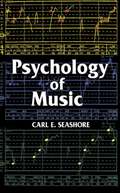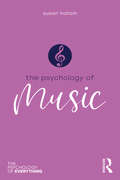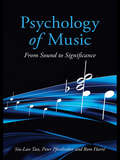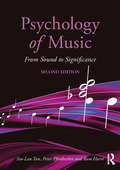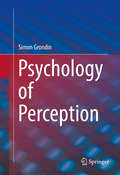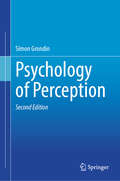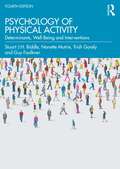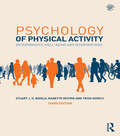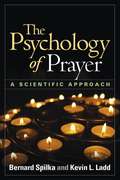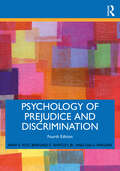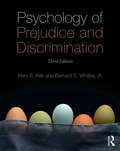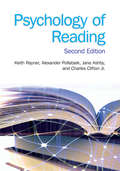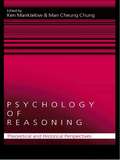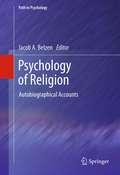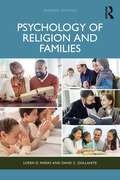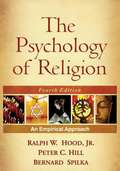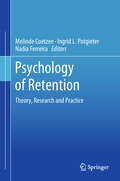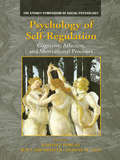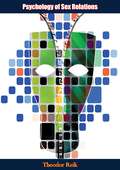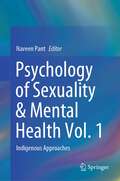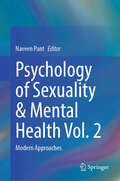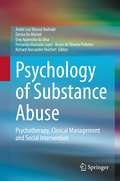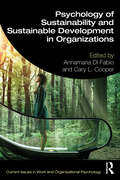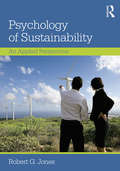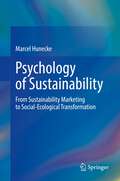- Table View
- List View
Psychology of Music
by Carl E. SeashoreBetween the physical world of vibration, as measured by apparatus, and the world of consciously heard music there is a third area of investigation. Our auditory apparatus and/or mind separates different instruments and tones, hears some vibrations but not others, adds tones to fill out the sound spectrum, etc. This middle ground is the province of the psychology of music, a subject about which even many physical scientists know little.This introduction, by the developer of the Seashore test of musical ability, is a thorough survey of this field, the standard book for psychologists specializing in the area, for the school, and for interested musicologists. It opens with the musical mind and with a series of chapters on music as a medium: vibrato, pitch, loudness, duration, timbre, tone, consonance, volume, and rhythm, dealing with each from the special point of view of the role of psychology. It then moves to such factors as learning, imagining, and thinking in music; the nature of musical feeling; the relative sound patterns of specific instruments and the human voice; measures of musical talent; inheritance of musical ability; primitive music; the development of musical skills; and musical aesthetics.This wealth of material is supplemented with dozens of oscillograms and other sound-pattern charts recorded from actual play and singing by Jeritza, Caruso, Paderewski, Szigeti, Rethberg, Menuhin, Martinelli, and other artists. An appendix cites two attitudes toward the evaluation of musical talent and over 200 bibliographic references.
Psychology of Music (The Psychology of Everything)
by Susan HallamHow does music affect our moods? What is the best way to develop musical skills? How does the definition of music vary between cultures? The Psychology of Music explores the important impact music has on our everyday lives, and its influence on society, groups and individual people. It demonstrates how music can benefit our intellectual functioning, and health and well-being, and examines musical ability as both a gift and something that can be developed through learning and practice. Music can enhance our understanding of humanity and modern life and The Psychology of Music shows us the significance of music, and the power it can have over our behaviour.
Psychology of Music: From Sound to Significance
by Rom Harré Siu-Lan Tan Peter PfordresherWhy are some disturbances of air molecules heard as 'noise' while others are perceived as music? What happens at the level of the sound wave, the ear, and the brain when we perform or listen to music? How do musical abilities emerge and develop, and become refined as one acquires musical expertise? And what gives music its deep emotional significance and its power to influence social behavior, across vastly different cultural contexts? These are some of the primary questions defining the field called 'the psychology of music' and driving the present volume. This book provides an introduction to classic and current studies in the psychology of music, combining a comprehensive summary with critical assessments of existing research. The volume captures the interdisciplinary breadth of the field, while covering central topics in depth. Part One explores sound and music at an acoustic level, explaining auditory events with respect to the workings of the ear and brain. Part Two focuses on perception and cognition of melody, rhythm, and formal structure. Part Three examines the emergence and development of musical skills, and turns to the most practical aspects of psychology of music: music practice and performance. Finally, Part Four broadens the discussion to the question of meaning in music, with respect to its social, emotional, philosophical, and cultural significance. Throughout, both behavioral and neuroscientific perspectives are developed. This book will be invaluable to undergraduate and postgraduate students in the fields of psychology and music, and will appeal to anyone else who is interested in the psychology of music.
Psychology of Music: From Sound to Significance
by Rom Harré Siu-Lan Tan Peter PfordresherIn Psychology of Music: From Sound to Significance (2nd edition), the authors consider music on a broad scale, from its beginning as an acoustical signal to its different manifestations across cultures. In their second edition, the authors apply the same richness of depth and scope that was a hallmark of the first edition of this text. In addition, having laid out the topography of the field in the original book, the second edition puts greater emphasis on linking academic learning to real-world contexts, and on including compelling topics that appeal to students’ natural curiosity. Chapters have been updated with approximately 500 new citations to reflect advances in the field. The organization of the book remains the same as the first edition, while chapters have been updated and often expanded with new topics. 'Part I: Foundations' explores the acoustics of sound, the auditory system, and responses to music in the brain. 'Part II: The Perception and Cognition of Music' focuses on how we process pitch, melody, meter, rhythm, and musical structure. 'Part III: Development, Learning, and Performance' describes how musical capacities and skills unfold, beginning before birth and extending to the advanced and expert musician. And finally, 'Part IV: The Meaning and Significance of Music' explores social, emotional, philosophical and cultural dimensions of music and meaning. This book will be invaluable to undergraduates and postgraduate students in psychology and music, and will appeal to anyone who is interested in the vital and expanding field of psychology of music.
Psychology of Perception
by Simon GrondinThis book defines the terminology used in the fields of sensation and perception and describes the biological and physical bases required for understanding sensory experiences. It offers more specifically an introduction to the study of psychophysics, auditory perception, visual perception, and attention, and discusses the basic concepts and mechanisms used to interpret different perceptual phenomena. Featured topics in this book: Laws of psychophysics, including the discrimination law of Weber and Stevens' power law. Psychophysical methods and signal detection theory. Hearing music and speech. Color, form and depth perception The role of attention in perception. Sensory disorders. Psychology of Perception is an essential resource for undergraduate and graduate students interested in studying sensation and perception.
Psychology of Perception
by Simon GrondinThis book defines the terminology used in the fields of sensation and perception and describes the biological and physical bases required for understanding sensory experiences. It offers more specifically an introduction to the study of psychophysics, auditory perception, visual perception, somesthesia, time perception, and attention, and discusses the basic concepts and mechanisms used to interpret different perceptual phenomena. Featured topics in this book: Laws of psychophysics, including the discrimination law of Weber and Stevens&’ power law. Psychophysical methods and signal detection theory. Hearing music and speech. Color, form and depth perception. Time perception. Somatosensory systems. The role of attention in perception. <span style="mso-fareast-font-family: 'Times New Roman'; mso-bidi-font-family: Calibri; mso-bidi-theme-font: minor-latin; mso-ansi
Psychology of Physical Activity: Determinants, Well-Being and Interventions
by Stuart J. Biddle Nanette Mutrie Trish Gorely Guy FaulknerThe positive benefits of physical activity for physical and mental health are now widely acknowledged, yet levels of physical inactivity continue to be a major concern throughout the world. Understanding the psychology of physical activity has therefore become an important issue for scientists, health professionals and policy-makers alike as they address the challenge of behaviour change. Psychology of Physical Activity provides comprehensive and in-depth coverage of the fundamentals of exercise psychology, from mental health, to theories of motivation and adherence, and to the design of successful interventions for increasing participation. Now publishing in a fully revised, updated and expanded fourth edition, Psychology of Physical Activity is still the only textbook to offer a full survey of the evidence base for theory and practice in exercise psychology, and the only textbook that explains how to interpret the quality of the research evidence. As the field continues to grow rapidly, the new edition expands the behavioural science content of numerous important topics, including physical activity and cognitive functioning, automatic and affective frameworks for understanding physical activity involvement, new interventions designed to increase physical activity (including use of new technologies), and sedentary behaviour. A full companion website offers useful features to help students and lecturers get the most out of the book during their course, including multiple-choice revision questions, PowerPoint slides and a test bank of additional learning activities. Psychology of Physical Activity is the most authoritative, engaging and up-to-date book on exercise psychology currently available. It is essential reading for all students working in behavioural medicine, as well as the exercise and health sciences.
Psychology of Physical Activity: Determinants, Well-Being and Interventions
by Stuart J. Biddle Nanette Mutrie Trish GorelyThe positive benefits of physical activity for physical and mental health are now widely acknowledged, yet levels of physical inactivity continue to increase throughout the developed world. Understanding the psychology of physical activity has therefore become an important concern for scientists, health professionals and policy-makers alike. Psychology of Physical Activity is a comprehensive and in-depth introduction to the fundamentals of exercise psychology, from theories of motivation and adherence to the design of successful interventions for increasing participation. Now in a fully revised, updated and expanded third edition, Psychology of Physical Activity is still the only textbook to offer a full survey of the evidence-base for theory and practice in exercise psychology, and the only textbook that explains how to interpret the quality of the research evidence. With international cases, examples and data included throughout, the book also provides a thoroughly detailed examination of the relationship between physical activity and mental health. A full companion website offers useful features to help students and lecturers get the most out of the book during their course, including multiple-choice revision questions, PowerPoint slides and a test bank of additional learning activities. Psychology of Physical Activity is the most authoritative, engaging and up-to-date introduction to exercise psychology currently available. It is essential reading for all students working in exercise and health sciences.
Psychology of Prayer
by Kevin L. Ladd Bernard SpilkaReviewing the growing body of scientific research on prayer, this book describes what is known about the behavioral, cognitive, emotional, developmental, and health aspects of this important religious activity. The highly regarded authors provide a balanced perspective on what prayer means to the individual, how and when it is practiced, and the impact it has in people's lives. Clinically relevant topics include connections among prayer, coping, and adjustment, as well as controversial questions of whether prayer (for oneself or another) can be beneficial to health. The strengths and limitations of available empirical studies are critically evaluated, and promising future research directions are identified.
Psychology of Prejudice and Discrimination
by Lisa S. Wagner Mary E. Kite Bernard E. Whitley, Jr.Psychology of Prejudice and Discrimination provides a comprehensive and compelling overview of what psychological theory and research have to say about the nature, causes, and reduction of prejudice and discrimination. It balances a detailed discussion of theories and selected research with applied examples that ensure the material is relevant to students. This edition has been thoroughly revised and updated and addresses several interlocking themes. It first looks at the nature of prejudice and discrimination, followed by a discussion of research methods. Next come the psychological underpinnings of prejudice: the nature of stereotypes, the conditions under which stereotypes influence responses to other people, contemporary theories of prejudice, and how individuals’ values and belief systems are related to prejudice. Explored next are the development of prejudice in children and the social context of prejudice. The theme of discrimination is developed via discussions of the nature of discrimination, the experience of discrimination, and specific forms of discrimination, including gender, gender identity, sexual orientation, age, ability, and appearance. The concluding theme is the reduction of prejudice. The book is accompanied by a comprehensive website featuring an Instructor Manual that contains activities and tools to help with teaching a prejudice and discrimination course; PowerPoint slides for every chapter; and a Test Bank with short answer and multiple-choice exam questions for every chapter. This book is an essential companion for all students of prejudice and discrimination, including those in psychology, education, social work, business, communication studies, ethnic studies, and other disciplines. In addition to courses on prejudice and discrimination, this book will also appeal to those studying racism and diversity.
Psychology of Prejudice and Discrimination: 3rd Edition
by Bernard E. Whitley Jr. Mary E. KiteThe Psychology of Prejudice and Discrimination provides a comprehensive and compelling overview of what psychological theory and research have to say about the nature, causes, and reduction of prejudice and discrimination. It balances a detailed discussion of theories and selected research with applied examples that ensure the material is relevant to students. Newly revised and updated, this edition addresses several interlocking themes, such as research methods, the development of prejudice in children, the relationship between prejudice and discrimination, and discrimination in the workplace, which are developed in greater detail than in other textbooks. The first theme introduced is the nature of prejudice and discrimination, which is followed by a discussion of research methods. Next comes the psychological underpinnings of prejudice: the nature of stereotypes, the conditions under which stereotypes influence responses to other people, contemporary theories of prejudice, and how values and belief systems are related to prejudice. Explored next are the development of prejudice in children and the social context of prejudice. The theme of discrimination is developed via discussions of the nature of discrimination, the experience of discrimination, and specific forms of discrimination, including gender, sexual orientation, age, ability, and appearance. The concluding theme is the reduction of prejudice. An ideal core text for junior and senior college students who have had a course in introductory psychology, it is written in a style that is accessible to students in other fields including education, social work, business, communication studies, ethnic studies, and other disciplines. In addition to courses on prejudice and discrimination, this book is also adapted for courses that cover topics in racism and diversity. For additional resources, consult the website BreakingPrejudice.org, which focuses on pedagogical materials that can be used to address both cultural awareness and self-awareness of prejudice and to increase students' multicultural competence. Specifically, the site includes: Original teaching activities (ready to use with minimal preparation, including discussion questions) An annotated list of podcasts (categorized by topic) An annotated list of videos (categorized by topic) A set of social justice songs (categorized by topic) Four original public service announcements 16 video diaries about people's personal experience with prejudice Interviews with 13 social justice activists
Psychology of Reading: 2nd Edition
by Keith Rayner Alexander Pollatsek Jane Ashby Charles Clifton Jr.Reading is a highly complex skill that is prerequisite to success in many societies in which a great deal of information is communicated in written form. Since the 1970s, much has been learned about the reading process from research by cognitive psychologists. This book summarizes that important work and puts it into a coherent framework. The book’s central theme is how readers go about extracting information from the printed page and comprehending the text. Like its predecessor, this thoroughly updated 2nd Edition encompasses all aspects of the psychology of reading with chapters on writing systems, word recognition, the work of the eyes during reading, inner speech, sentence processing, discourse processing, learning to read, dyslexia, individual differences and speed reading. Psychology of Reading, 2nd Edition, is essential reading for undergraduates, graduates, and researchers in cognitive psychology and could be used as a core textbook on courses on the psychology of reading and related topics. In addition, the clear writing style makes the book accessible to people without a background in psychology but who have a personal or professional interest in the process of reading.
Psychology of Reasoning: Theoretical and Historical Perspectives
by Man Cheung Chung Ken ManktelowThis collection brings together a set of specially commissioned chapters from leading international researchers in the psychology of reasoning. Its purpose is to explore the historical, philosophical and theoretical implications of the development of this field. Taking the unusual approach of engaging not only with empirical data but also with the ideas and concepts underpinning the psychology of reasoning, this volume has important implications both for psychologists and other students of cognition, including philosophers. Sub-fields covered include mental logic, mental models, rational analysis, social judgement theory, game theory and evolutionary theory. There are also specific chapters dedicated to the history of syllogistic reasoning, the psychology of reasoning as it operates in scientific theory and practice, Brunswickian approaches to reasoning and task environments, and the implications of Popper's philosophy for models of behaviour testing. This cross-disciplinary dialogue and the range of material covered makes this an invaluable reference for students and researchers into the psychology and philosophy of reasoning.
Psychology of Religion
by Jacob A. BelzenIn the past four decades or so, the so-called psychology of religion - after having been deemed extinct, impossible or unlikely - has risen to prominence again: the number of publications is rapidly growing, an impressive secondary literature (handbooks, introductions, etc.) is available already, infrastructure has been developed (a number of new journals devoted to the subject have been founded, organizations have been established, increasingly funding is going to the area), attracting many new researchers. Organizations like the American Psychological Association are now publishing in the field of psychology of religion (and its Div. 36 ["psych of rel"] with almost 3,000 members is already midsized among the APA-divisions). This book documents this re-emergence and development.
Psychology of Religion and Families (Textbooks in Family Studies)
by Loren D. Marks David C. DollahiteNow in its second edition, this multidisciplinary text addresses the growing scholarly connection between religion and family life while offering an accurate and engaging account of why and how families are impacted by their religion.This updated volume integrates the social science literature from family studies, psychology, sociology, and religion with narratives drawn from in-depth interviews with 300 racially, religiously, and regionally diverse families that bring the concepts to life. Written in a thought-provoking, accessible style by two of the leading researchers in the field, this book reflects the author’s first-hand experience in teaching today’s students about religion’s influence on families. This book examines Christianity, Judaism, and Islam, addresses the impact of religious involvement on longevity, divorce rates, and parenting styles, and considers demographic, family, couple, and individual-level data that relate to prayer and other sacred practices. New chapters explore: The Conflicts, Struggle, and Stressors of Religion Racial and Ethnic Minorities and Religion Religion, Sex, and Gender Roles in Marriage Pedagogical features include boldfaced key terms defined in the glossary, text boxes, chapter conclusions, summary points, and review questions. Intended as a text for undergraduate courses in family and religion, the psychology or sociology of the family, the psychology or sociology of religion, pastoral/biblical counseling, or family and youth ministry, taught in human development and family studies, psychology, sociology, religion, social work, pastoral counseling, and philosophy, this book is also relevant to family therapists and counselors.
Psychology of Religion, Fourth Edition
by Ralph Hood Jr. Peter HillScholarly and comprehensive yet accessible, this state-of-the-science work is widely regarded as the definitive psychology of religion text. The authors synthesize classic and contemporary empirical research on numerous different religious groups. Coverage includes religious thought, belief, and behavior across the lifespan; links between religion and biology; the forms and meaning of religious experience; the social psychology of religious organizations; and connections to morality, coping, mental health, and psychopathology. Designed for optimal use in advanced undergraduate- and graduate-level courses, every chapter features thought-provoking quotations and examples that bring key concepts to life. New to This Edition Revised and updated with the latest theories, methods, and empirical findings. Many new research examples. Restructured with fewer chapters for better 'fit' with a typical semester. More attention to the differences between religion and spirituality Covers emerging topics genetics and neurobiology, positive psychology, atheism, and more.
Psychology of Retention: Theory, Research And Practice
by Melinde Coetzee Ingrid L. Potgieter Nadia FerreiraThis book offers a contemporary review of talent retention from the viewpoint of human resource management and industrial/organisational psychology. With a practical and relevant perspective it enriches critical knowledge and insight in the psychology of talent retention. It offers interpretation of difficult factors facing organisations such as the conceptualisation of talent, the forecasting of talent demand and supply, external and internal factors that influence talent attraction, development and retention, the alignment between talent management and business strategy. Also covered is the implementation of human resource practices and strategies in response to the needs of different organisational contexts and workforce characteristics. The chapter contributions will not only enrich knowledge and insight in the complex phenomenon of talent retention, but also advance new original ways of thinking and researching this critically important area of inquiry. The book is intended for graduate students and researchers as an overview of the topic of talent retention, practitioners will also find it informative.
Psychology of Self-Regulation: Cognitive, Affective, and Motivational Processes (Sydney Symposium of Social Psychology)
by Roy F. Baumeister Joseph P. Forgas Dianne M. TiceThe ability to regulate and control our behaviors is a key accomplishment of the human species, yet the psychological mechanisms involved in self-regulation remain incompletely understood. This book presents contributions from leading international researchers who survey the most recent developments in this fascinating area. The chapters shed new light on the subtle and often subconscious ways that the people seek to regulate their thoughts, feelings and behaviors in everyday social life. The contributions seek answers to such intriguing questions as: How can we improve our ability to control our actions? How do people make decisions about which goals to pursue? How do we maintain and manage goal-oriented behavior? What happens when we run out of self-regulation resources? Can we match people and the regulatory demands of to specific tasks so as to optimize performance? What role does self-regulation play in sports performance, in maintaining successful relationships, and in managing work situations? The book offers a highly integrated and representative coverage of this important field, and is suitable as a core textbook in advanced courses dealing with social behavior and the applications of psychology to real-life problems.
Psychology of Sex Relations
by Theodor ReikWitty and fascinating look at Love and the Sex-Drive from world-renowned expert psychoanalysist Theodor Reik.“This book was first published in 1943 and will have been read long ago by all senior psychoanalysts and most students of psychopathology…Even the most obdurate opponents of psychodynamic theory must be disarmed by the high quality of the writing and lost in admiration for the erudition of the author, whose copious quotations, allusions and aphorisms are nearly always apt and frequently both witty and illuminating. They cover a wide field of learning in several languages and range from philosophy and psychology to Lewis Carroll, Punch and the popular press. Too often the ponderous jargon and turgid style of psychoanalytical papers bring back at least one reader to the schoolroom, where he is trying ineffectively to construe the more involved passages of Livy or Thucydides. It is, therefore, refreshing to find a serious work from a psychoanalyst written in clear and impeccable English and leavened on every page with natural sincerity and effortless humour.The main objective of the book is to demonstrate that love, affection and tenderness are not the product of aim-inhibited sex and to controvert the Freudian doctrine that all forms of love are exclusively of sexual origin. Although the author remains a warm and generous admirer of his original teacher, Freud, and of his genius and achievements, he demolishes his libido theory with criticisms, barbed with ironic wit. "His libido system, however, will, I am afraid, have the sad destiny which Herbert Spencer once bemoaned in speaking of 'a beautiful theory that was murdered by a gang of brutal facts"'-British Journal of Psychiatry.
Psychology of Sexuality & Mental Health Vol. 1: Indigenous Approaches
by Naveen PantThis book focuses on indigenous and Indian concepts of sexuality, exploring its psychology and its relationship with mental health. Through theoretical, review, exploratory and mixed approaches, the book delves into common fields of thought regarding indigenous sexuality which relate to psychology and mental health. In the first section of the book, ‘Psychology of Sexuality & Indigenous Approaches’, the book discusses various indigenous aspects of sexuality, such as Indian indigenous, Hindu, and Buddhist. The second section of the book, ‘Indigenous Psychology of Sexuality and Mental Health’, discusses indigenous aspects combined with sexuality and mental health.
Psychology of Sexuality & Mental Health Vol. 2: Modern Approaches
by Naveen PantThis book is the second volume of Psychology of Sexuality & Mental Health. It is about modern approaches in the psychology of sexuality and mental health. This is a unique book which focuses mainly on current trends in Human Sexuality, its psychology and its relationship with mental health. In this book’s sections and scientific chapters, effort is made to include common fields of modern sexuality thoughts which relates to Psychology and Mental Health. The first section of the book is “Modern Approaches on Psychology of Sexuality”, which through its different chapters, discusses and scientifically explores modern aspects of sexuality including current trends, sexuality education, asexuality, sexual orientation, and the issues of the LGBT community and effects of menopause etc. The section is supported by both systematic reviews and empirical approach. The second section of the book is “Modern Psychology of Sexuality and Mental Health”, which discusses modern correlates of combining sexuality and mental health including HIV, pornography, mental illness and sexuality, and mental health correlates for LGBT and transgender people. The section further looks at the attitude towards sexuality education and its impact on mental health among students. Both sections include genuine scientific studies, empirical research and systematic reviews. Thus this book, rich in content & text, is addressed to students, researchers, scientists, and readers of the field.
Psychology of Substance Abuse: Psychotherapy, Clinical Management and Social Intervention
by André Luiz Monezi Andrade Eroy Aparecida da Silva Denise De Micheli Fernanda Machado Lopes Bruno de Oliveira Pinheiro Richard Alecsander ReichertThis book is a guide for psychologists working with substance users in different healthcare settings, from private clinical practice to larger health institutions and community services. It presents a comprehensive overview of the different aspects involved with substance use disorders from a psychological perspective, from prevention to recovery. The volume offers an integrative view about neurobiological, behavioral and psychosocial aspects related to becoming a substance user; shows how psychological assessment tools can be used to diagnose substance use disorders; describes how different kinds of psychotherapy can be applied in the treatment of substance use disorders; and presents a range of evidence-based clinical and social interventions designed for both prevention and treatment of substance use disorders. Apart from covering the whole range of services related to the prevention, diagnosis and treatment of substance use disorders, the volume also shows how these issues can be approached from different theoretical perspectives within psychology, such as: Behavioral and Cognitive Psychology Neuropsychology Existential Psychology Phenomenology Psychoanalysis Analytical Psychology Community and Social Psychology Psychology of Substance Abuse: Psychotherapy, Clinical Management and Social Intervention will be a useful resource for psychologists and other health professionals working with substance users, as well as to undergraduate and graduate students looking for a comprehensive introduction to the psychology of substance abuse.
Psychology of Sustainability and Sustainable Development in Organizations
by Cary L. Cooper Annamaria Di FabioThis volume answers calls for improving sustainability and sustainable development in organizations from a psychological point of view. It offers a range of perspectives on the current research in the psychology of sustainability and sustainable development to highlight effective ways of improving well-being and healthy sustainable development in organizations. Section 1 introduces the concept of the psychology of sustainability and sustainable development as well as macro topics of related issues in organizations. Section 2 focuses on themes traditionally recognized in organizational psychology literature, such as performance, negotiation, leadership, resistance to change, innovation, and digital transformation. Section 3 presents variables to enhance sustainability and sustainable development in organizations and considers levels of prevention. Topics include humor awareness as a primary prevention resource in organizations, intrapreneurial self-capital as an individual preventative strength, compassion within organizations, perfectionism as an inhibitor in organizational contexts, and job crafting from individual to collaborative to organizational, meaningfulness and sustainable careers. With a clear psychological focus on the topic of leading sustainability efforts, this book will be of great interest to students and academics who want to learn more about corporate sustainability. It is also a useful resource for business executives, team leaders and managers.
Psychology of Sustainability: An Applied Perspective
by Robert G. JonesPsychology of Sustainability: An Applied Perspective examines the many psychological factors that lead to human behavioral effects on the environment. Each chapter will apply elements from a basic research area into the context of criteria specific to sustainability. Increased interest has led many universities to offer courses on "Psychology of Sustainability." This book is the perfect text to provide an introduction to the subject. Throughout the book, readers will find new ways of framing questions related to human adaptability and evolutionary psychology. Psychology of Sustainability is ideal for students or professionals who are looking to contribute to the conversation.
Psychology of Sustainability: From Sustainability Marketing to Social-Ecological Transformation
by Marcel HuneckeThis book analyzes key findings and developments of psychology for sustainable development. The starting point is a discussion of the established literature of environmental psychology in regards to which factors influence environment-related behavior. Afterwards, the author discusses strategies and interventions that can promote sustainable behavior. It is very important that in order to increase the effectiveness of environmental psychological interventions, these must be first contextualized socially. Furthermore, interventions that aim to bring about a socio-ecological transformation should also focus on the goal of subjective well-being. Overall, the findings of environmental psychology are brought together with theories from positive psychology and the approach of psychological resources from positive psychology and the approach of psychological resources from health psychology to answer the question: How can the socio-ecological transformation of a consumer society be supported by an inner transformation of human beings. An answer to this question is provided by the promotion of six psychological resources for sustainable lifestyles: mindfulness, capacity for pleasure, self-acceptance, self-efficacy, construction of meaning and solidarity can both promote individual well-being and increase motivation for sustainable behavior.
